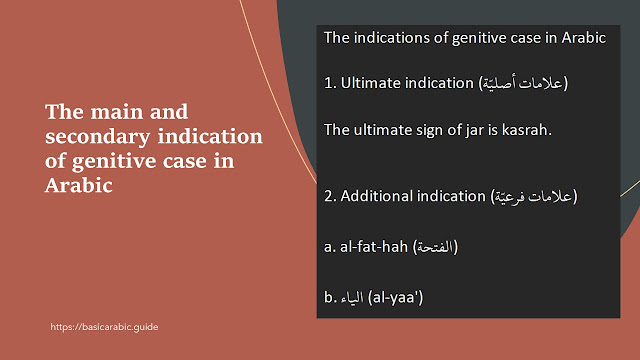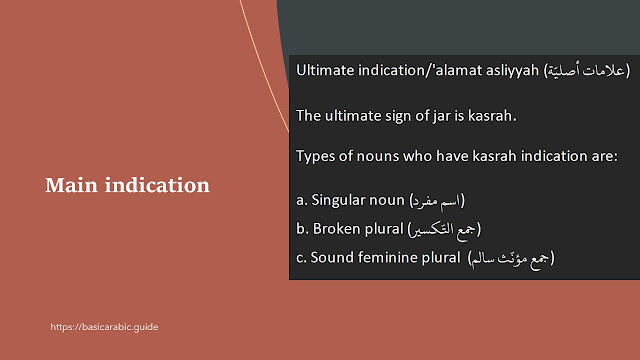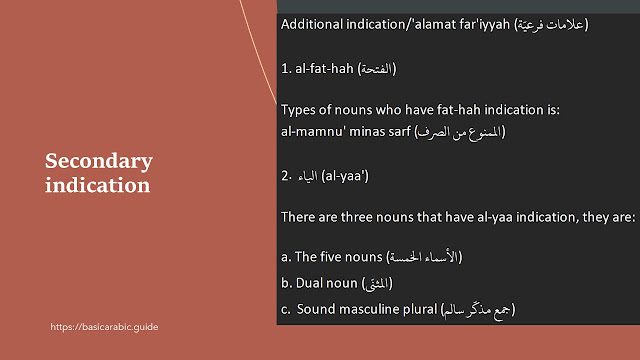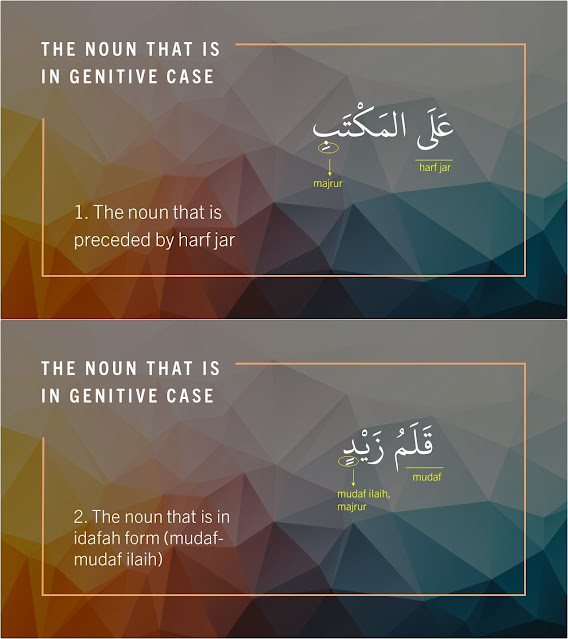Understanding Genitive Case (الجرّ) in Arabic Grammar: Signs & Examples
In the previous lesson, we learned about the indications of accusative case (علامة النّصب) in Arabic.
We saw that the ultimate indication of accusative case is marked by fat-hah (الفتحة) on the end of the noun.
In this lesson, we'll learn about the indications of genitive case (علامة الجر) in Arabic. The ultimate indication of genitive case is marked by kasrah (الكسرة) on the end of the noun.
The genitive case is used to indicate possession, relationship, purpose. For example, "Muhammad's book" or "the book of Muhammad", we say it in Arabic "كِتَابُ مُحَمَّدٍ" (kitaabu Muhammadin). مُحَمَّدٍ is in genitive case that is marked by kasrah "i" because it indicate possession (idafah form).
Please continue reading to learn more about the complete indications of genitive case in Arabic.
First of all, we'll know the definition of genitive case.
What is genitive (الجرّ)?
الجر: تغيير مخصوص وعلامته الكسرة وما ناب عنها
The meaning: special changes that are indicated by kasrah and anything that represents kasrah.
By reading the definition of jar (genitive), we conclude that there are two indications of genitive case, they are: ultimate indication (indicated by kasrah), and additional indications that represent kasrah.
The indications of genitive case in Arabic
1. Ultimate indication (علامات أصليّة)
The ultimate sign of jar is kasrah.
Types of nouns who have kasrah indication are:
a. Singular noun (اسم مفرد)
Example of singular noun: زَيْدٌ (Zaid).
Sentence example using singular noun in genitive case:
1st example
مَرَرْتُ بِزَيْدٍ (marartu bizaidin).
The meaning: I passed Zaid.
- مَرَرْتُ : fi'l madi with damir muttasil 'ت' which is acted as fa'il.
- بِ: harf jar
- زَيْدٍ : ism majrur, it is in genitive case because preceded by har jar "ب"
2nd example
القَلَمُ عَلَى المَكْتَبِ (al-qalamu 'alal maktabi).
The meaning: The pen is on the table.
- القَلَمُ : mubtada' marfu', the indication of the rafa' is dammah "u".
- عَلَى: harf jar
- المَكْتَبِ : ism majrur, it is in genitive case (majrur) because of har jar "عَلَى", the indication of the jar is kasrah "i".
عَلَى المَكْتَبِ : jar wa majrur, which is acted as khabar.
b. Broken plural (جمع التّكسير)
Example of broken plural: رِجَالٌ (rijaalun) => men
Sentence example using broken plural in genitive case (majrur condition):
مَرَرْتُ بِرِجَالٍ (marartu birijaalin).
The meaning: I passed men.
رِجَالٍ is in majrur condition (genitive case) because it is preceded by harf jar "ب".
c. Sound feminine plural (جمع مؤنّث سالم)
Example of sound plural feminine: مُوَظَّفَاتٌ (muwazzafaatun) => female employees.
Sentence example using sound plural feminine in majrur condition:
مَرَرْتُ بِالمُوَظَّفَاتِ (marartu bil muwazzafaati).
The meaning: I passed the female employees.
2. Additional indication (علامات فرعيّة)
a. al-fat-hah (الفتحة)
The type of noun that has fat-hah sign is al-mamnu' minas sarf (الممنوع من الصرف).
Example al-mamnu' minas sarf : زَيْنَبُ (zainabu) => Zainab.
==Read mamnu' minas sarf here: noun that never get a tanwiin ==
Sentence example using al-mamnu' minas sarf noun that is in genitive case:
سَافَرْتُ مَعَ زَيْنَبَ (saafartu ma'a zainaba).
The meaning: I traveled with zainab.
- سَافَرْتُ: fi'l madi with damir muttasil "ت" that is acted as fa'il.
- مَعَ : mudaf.
- زَيْنَبَ : mudaf ilaih majrur, the indication of the jar is fat-hah "a".
b. الياء (al-yaa')
There are three nouns that have al-yaa indication, they are:
b1. The five nouns (الأسماء الخمسة)
Example:
مَرَرْتُ بِأَخِيْكَ (marartu biakhiika).
The meaning: I passed your brother.
أَخِي is in genitive case because it is preceded by harf jar, and the indication of the jar is "ي"
b2. Dual noun (المثنّى)
Example:
مَرَرْتُ بِطَالِبَيْنِ (marartu bitaalibayni).
The meaning: I passed two students.
طَالِبَيْنِ is in genitive case because of harf jar "ب", and the indication of the jar is "ي"
c1. Sound masculine plural (جمع مذكّر سالم)
Example:
مَرَرْتُ بِفَلاَّحِيْنَ (marartu bifallaahiina)
The meaning: I passed farmers.
فَلاَّحِيْنَ is in genitive case (majrur) because of harf jar "ب", and the indication of it's jar is "ي".
Summary
By reading the examples above, we can conclude that the noun that is in genitive case are:
1. The noun that is preceded by harf jar, for example: عَلَى المَكْتَبِ ('alal maktabi), al-maktabi (المكتب) is in genitive case (majrur) because it is preceded by har jar "عَلَى"
2. The noun that is in idafah form (mudaf-mudaf ilaih), the noun that is acted as mudaf ilaih is majrur, for example: قَلَمُ زَيْدٍ , zaidin (زَيْدٍ) is majrur because it is mudaf ilaih.
3. The main indication of the jar is kasrah "i".
4. The additional indication of the jar that represents the kasrah are fat-hah and yaa.
====
Let's study the next lesson: ism mabniy






No comments:
Post a Comment